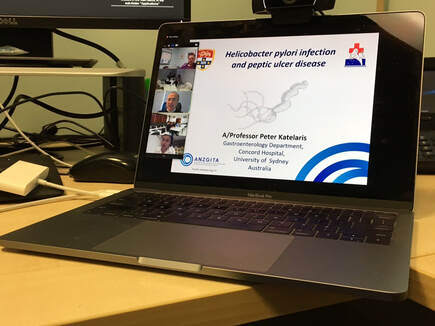Virtual Training - using Digital Technologies for Learning & Mentoring

In 2022, in COVID times, ANZGITA is focusing on Virtual Training activities. The initial step in 2018 of establishing webinars was part of a broader, longer-term objective lead by Assoc Prof Chris Hair of a Pacific GI tele-education virtual program which delivers multiple services which help overcome the challenges confronted by doctors and nurses who live and practise in the "Blue Continent". These challenges include a sense of isolation which is both geographic (large distances and high travel costs) and professional (access to experienced specialist colleagues) and no formal learning framework outside of possible ANZGITA in-country training programs which might only occur annually.
Our Virtual Training Program includes the Pacific Gut Club and piloting of the virtual Teaching Endoscopy by Remote Mentoring (vTERM) project in Palau.
Our Virtual Training Program includes the Pacific Gut Club and piloting of the virtual Teaching Endoscopy by Remote Mentoring (vTERM) project in Palau.
Technology Developments Enabling Progress
The common denominators currently is the ubiquitous presence of mobile communications accompanied by the increasing implementation of fibre optic cable connections into Indo-Pacific developing nations. Smart phone based communication apps such as Viber, WhatsApp, Zoom and Skype have been trialled and found to be effective (to varying degrees) for some of our training and support needs. Much higher bandwidths which support quality high definition video will be needed to support more advanced training. Solutions such as fixed wireless and laser links are becoming feasible in the region in addition to the traditional costly laying of dedicated fibre optic cable connections.
The commissioning of an Australian Government funded undersea optical fibre cable to Solomon Islands and Papua New Guinea in 2020 has provided improved quality (higher bandwidth) connections. This new cable complements a number of other undersea cables which cross the Pacific via other PICTs, e.g. Fiji, Samoa, Tonga, and from which further subsidiary cables are run to internal islands and other PICTs.
The major issue for high quality connections that will adequately display information like the HD video image supplied by an endoscope has become the cost of a high bandwidth 'last mile', i.e. the connection between the hospital where a clinician who participates in the webinar is located and a service provider's cable-connection facility. Installation and operating funding for such connections has been very difficult for our partners to secure from hospital budgets and we are working with them to determine the most cost effective solutions and potential funding sources.
Once installed, it is not difficult to imagine that other applications will be identified by hospital medical staff. As an example, Dr Payne Perman in Federated States of Micronesia, who has secured a high bandwidth connection to his hospital through generous donations, has instituted a certified service with a lab in Tokyo. It analyses HD images of slide specimens and provides results within 48 hours compared to the many days previously required when a specimen was sent by air.
The commissioning of an Australian Government funded undersea optical fibre cable to Solomon Islands and Papua New Guinea in 2020 has provided improved quality (higher bandwidth) connections. This new cable complements a number of other undersea cables which cross the Pacific via other PICTs, e.g. Fiji, Samoa, Tonga, and from which further subsidiary cables are run to internal islands and other PICTs.
The major issue for high quality connections that will adequately display information like the HD video image supplied by an endoscope has become the cost of a high bandwidth 'last mile', i.e. the connection between the hospital where a clinician who participates in the webinar is located and a service provider's cable-connection facility. Installation and operating funding for such connections has been very difficult for our partners to secure from hospital budgets and we are working with them to determine the most cost effective solutions and potential funding sources.
Once installed, it is not difficult to imagine that other applications will be identified by hospital medical staff. As an example, Dr Payne Perman in Federated States of Micronesia, who has secured a high bandwidth connection to his hospital through generous donations, has instituted a certified service with a lab in Tokyo. It analyses HD images of slide specimens and provides results within 48 hours compared to the many days previously required when a specimen was sent by air.
